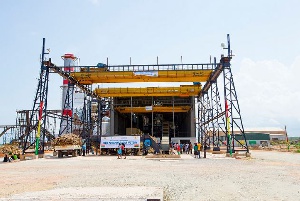Workers of the newly built Komenda Sugar Factory are fuming with rage over what they described as attempts to paint a gloomy picture about the operational viability of the $36.5 million project.
According to them, they have been monitoring comments in the media which they find very unfavourable and unfortunate. The workers who spoke to Captain Smart of Adom FM Morning live from the plant site, said they are appalled by the development which is making them feel uncomfortable.
The programme attracted scores of residents who joined the debate and accused critics of deliberately creating uncertainty to scare out growers to sabotage government’s initiative.
Odame, a worker in charge of piping works at the factory said, “the opposition must criticise constructively and government must also take criticisms in good faith but the negatives we are hearing about this factory are very unfortunate. But the truth is Captain Smart you have seen it all today, we are working.”
The workers’ comments come in the wake of conflicting reports about the factory’s operations since it was commissioned by President John Mahama last month. The Minority in Parliament had raised doubt when they told a news conference the factory was shut down two days after its commissioning.
But the workers have dismissed that assertion. Mark Kumson, a welder at the factory said: “You can't sit in Accra, Kumasi or somewhere else and concoct something about the factory. There is enough sugar cane and no machine has been taken outside the country for maintenance. We are working 24hours”.
Policy think tank IMANI has predicted that the Komenda Sugar Factory is doomed to fail because it is not backed by economic sense. They argue that the factory is more likely to serve the government’s propaganda purposes months to the November 2016 elections than produce sugar.
But evidence on the ground prove otherwise. Suppliers are chasing the factory and it has already taken delivery of over 4,000 tonnes.
Another 1,000 harvesters have been registered to go to the farms to cut canes while more than 1,080 outgrowers have expressed readiness to plant seedlings provided by the factory this rainy season.
A 32-acre sugarcane plantation owned by the company is expected to provide high grade hybrids and officials say they are already cultivating a 128 acre plantation ahead of a large scale plantation to be irrigated with a 24.5 million dollar loan from the bank.
Management of the factory are in touch with traditional leaders to reclaim about 3,000 acres which will supply about 40 percent of raw materials needed.
One of the agitated workers who took advantage of the Adom FM program to speak his mind said: “We have done all the works, we are testing the machines pending the receiving of the first sugar. All that have been said about shortage of sugarcane and machine breakdown is untrue. We are destroying our own country with our mouths because of politics. We are working 24/7 to make sure this thing becomes a success. Why do we do this to ourselves? All you are hearing is false. We even have brown sugar now. We can open it for you to see. We are just waiting for the white sugar. I get worried when I hear sad news about the breakdown of the factory which is untrue.”
The new Komenda Sugar Factory was established with $35 million concessional loan from the Indian government through the Export Import Bank of India. Government is securing an additional 24.5 million dollars from the Indian government to construct irrigation dams and plantations as well as seed capital to out growers to plant sugarcanes.
The new Komenda Sugar Factory is fully state-owned but government says it is considering offering shares to private investors including Ghanaians to ensure efficient management and the sustainability of the project. The first cake of sugar is expected to be ready by Friday, June 17, 2016.
The old factory, built by Ghana’s first president Kwame Nkrumah in the 1960s went out of operation in the 1980s and was liquidated in 1995.
Business News of Tuesday, 14 June 2016
Source: starrfmonline.com













